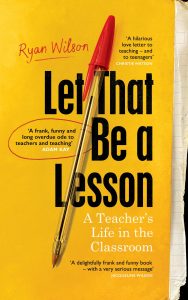Ryan Wilson (Broadcast Journalism, 2017) spent a decade working as a teacher, his childhood dream job. In 2016, he decided to pursue another life-long passion but also wanted to share his experiences of working in education. The result is his often humorous, but also reflective new memoir Let That Be a Lesson – A Teacher’s Life in the Classroom, published this August.
 “I wanted to be a teacher since I was about five or six! I think quite a lot of kids go through that phase, partly because it’s one of the only jobs you’ve come into contact with, but for me, it was enduring,” Ryan explains. “It’s so embarrassing looking back, but I did get a massive blackboard for my eight birthday. I’d mark work from imaginary students and call registers and make worksheets.”
“I wanted to be a teacher since I was about five or six! I think quite a lot of kids go through that phase, partly because it’s one of the only jobs you’ve come into contact with, but for me, it was enduring,” Ryan explains. “It’s so embarrassing looking back, but I did get a massive blackboard for my eight birthday. I’d mark work from imaginary students and call registers and make worksheets.”
As a single-minded youngster, nothing would deter him.
“Lots of people tried to put me off, not least many of my own teachers. But I was absolutely determined.”
Ryan loved working with his young students and has a long list of fond memories of his time as a teacher, but the realities of primary and secondary education made it difficult to focus on what really matters.
“The big problem in schools, as I see it, is the constant, unrelenting pressure to make sure your classes get good exam results. Schools – and to large extent headteachers – are judged by Ofsted and Ofsted love exam results. That puts a huge amount of pressure on school leaders which it’s all too easy to pass on down the food chain. The result is constant and wearying monitoring of classes through endless data and lesson observations,” he says.
The way Ryan describes it, it’s easy to see why he doesn’t think this is an ideal environment for teachers and students.
“It diminishes the importance of things like how well rounded the kids are or how happy they are, or the extra-curricular activities they do and any number of other things. And even if all the data looks great and all the results hit the targets, what then? We’ve succeeded in teaching kids to pass exams. Is that really the sum total of what success looks like for a school?”
Along with the constant monitoring, budget cuts put additional pressure on the teaching staff.
“In the year before I left seven teachers left and weren’t replaced. By that time I was in senior management, working as an assistant headteacher, so I was more keenly aware of the pressure. The final straw came when I was in a meeting where we were discussing whether we should hold a minute’s silence for the victims of a terrorist attack. I said I thought we should, and a colleague agreed, saying “Ofsted love that sort of thing.” It just reinforced that the tail is so firmly wagging the dog.”
 Although Ryan left teaching to become a student again, he didn’t leave the topic behind. Instead, he used his experience to write his first memoir Let That Be a Lesson – A Teacher’s Life in the Classroom.
Although Ryan left teaching to become a student again, he didn’t leave the topic behind. Instead, he used his experience to write his first memoir Let That Be a Lesson – A Teacher’s Life in the Classroom.
“Most days when I was teaching, I thought “there’s a book in this!” There are just so many great stories that arise out of working with kids. From the hilarious to the weird to the sad to the uplifting. So, there are just so many of the ingredients of a good book in the raw material,” he says.
But he didn’t just want to tell entertaining anecdotes.
“I also think anyone who hasn’t taught will be unaware of so many aspects of the job and the pressures, but many of them will know children or have children of their own who are going through the system, so I think it’s important they do know.”
He also regards the work teachers do very highly and thinks it should get more attention.
“I wanted to celebrate the joy of teaching and teachers. It’s a profession which people so often look down on or disregard or belittle, and it’s shameful because it is one of the most important, wonderful, vital jobs around.”
So, the book isn’t all about anecdotes, but there are definitely stories worth retelling.
“I wanted the book to be funny because teaching is full of laugh-out-loud moments and I love them! So quite a lot of the writing is light and comedic. But at other times the tone is angry or sad or reflective or frustrated…. I think that accurately reflects the gamut of emotions you go through in a day in teaching!”
What are some of Ryan’s favourite memories?
“I don’t know what it is about teaching, but there were just so many laughs. I remember starting teaching Richard III to year 8 and telling them it was a play by Shakespeare and asking them whether they could name any other plays Shakespeare had written. There was a collective shrugging of shoulders and a big pause before one boy put his hand up and said, “I’m not 100% sure, but I’m 99% sure there’s one called James and the Giant Peach.” Another time the Head of PE sent round an email saying that a child had just struggled for five minutes to get into his sports shirt before realising it was a pillowcase he had accidentally brought with him. And then there was the boy who, in a sex education lesson, thought that abstinence meant only putting your penis in a girl’s ear. You couldn’t make it up.”
Having left teaching, what made Ryan choose broadcast journalism as his next profession?
“I have always been a total radio geek and harboured a secret desire to work in the industry,” he says. “So I did a bit of research and found that the MA Broadcast Journalism course at City was well regarded in the industry. It was a great year. Going back to university as a mature student was a revelation. I felt much more comfortable in my own skin and confident in my abilities than I had as an undergraduate and it was lovely to be able to immerse yourself in a subject which you were genuinely interested in. It was also great for opening doors in the broadcasting world. In the two weeks after the course ended, I did a placement at The Jeremy Vine Show on Radio 2, and I ended up working there for four years. I’m very grateful to City.”
With a few years of journalism under his belt, Ryan still feels like he made an excellent choice.
“Live radio brings a fantastic buzz. Nothing rivals it. I’ve always loved news and current affairs so doing it as a job doesn’t really feel like work. Every morning we pitch stories we think the show could cover that day, so there’s the chance to influence what goes out on air, and therefore what people are thinking about and talking about, which is the most enormous privilege.”
If someone wanted to become a teacher and/or a broadcast journalist, what would Ryan’s advice be?
“I have spelled out my concerns about teaching, and why I feel it’s under threat. But it’s important to state that teaching – as distinct from some of the nonsense that can come with being a teacher – is still absolutely brilliant. The classroom stuff is still incredible fun. And an enormous privilege. You need to find a school with a Headteacher who is sensible and capable of filtering the stuff that actually matters from the stuff the government sometimes says matters. And you will probably need to have the confidence to do a bit of that sort of filtering yourself!”
As for broadcast journalism …
“It can be a tough industry to get into simply because there are more people who want to do it than there are available jobs, so you need to persevere. Try to build relationships with people in the industry even if that’s through social media in the first instance and get your foot in the door however you can. And once you’re there just set about making yourself as useful and good to work with as you can. It’s another brilliant sector to work in.”
A big thank you to Ryan Wilson for talking to us about his new book “Let That Be a Lesson” and his passion for teaching and broadcast journalism.
Photo credit: Liz Seabrook
